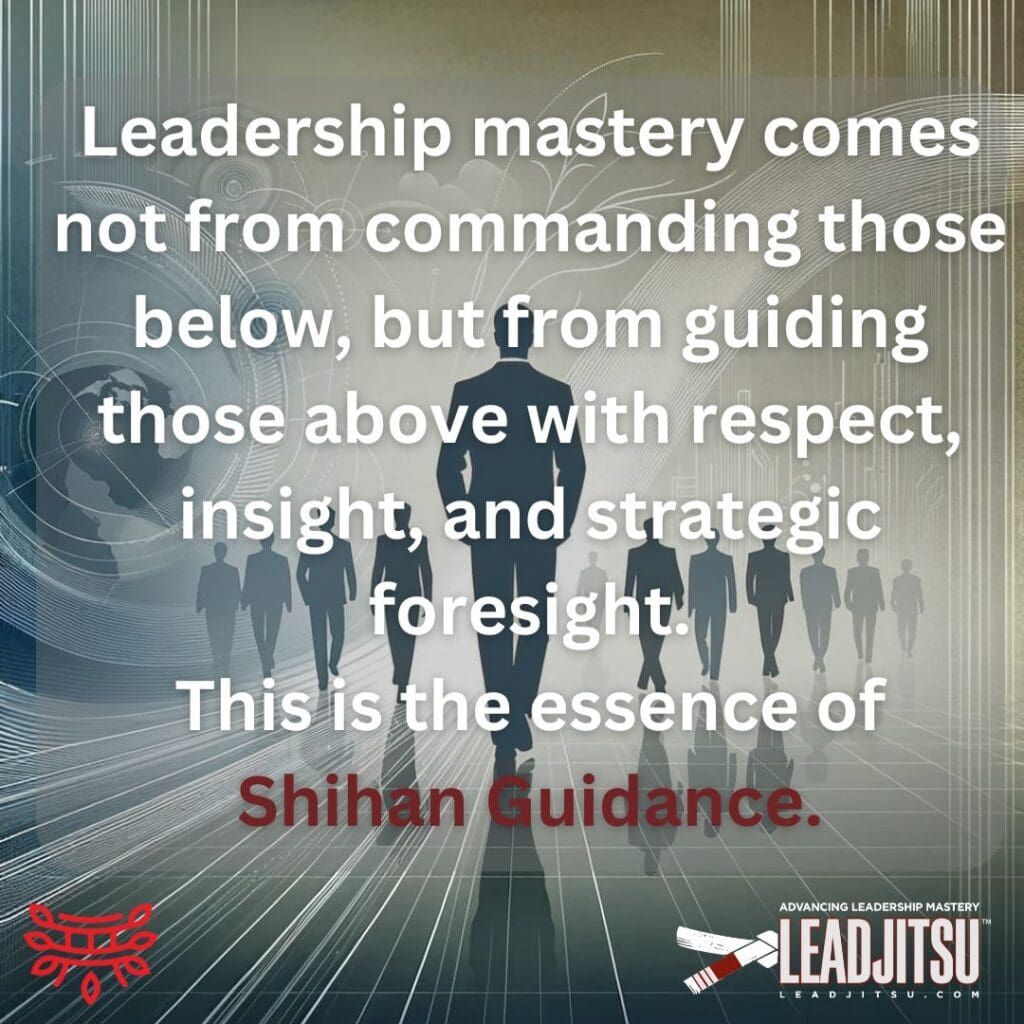Elevating Leadership Through Strategic Influence
In the realm of martial arts, the title “Shihan” is bestowed upon masters or senior instructors who possess a profound depth of knowledge and an unparalleled ability to teach and guide others. In the context of LEADJITSU, Shihan Guidance represents a strategic approach to influencing and contributing to the decision-making processes of higher-level management. This practice emphasizes respectful and insightful communication, proactive problem-solving, and a keen understanding of the leaders’ goals and challenges.
While Shihan Guidance is an invaluable skill, not mastering it can lead to significant downsides, including relationship friction, emotional and mental frustrations, and missed opportunities for organizational growth.
In this blog, we will explore the importance of Shihan Guidance, the potential pitfalls of not practicing it skillfully, and three actionable ways leaders can improve their Shihan Guidance.
The Importance of Shihan Guidance
Shihan Guidance is not just about managing relationships with superiors; it’s about fostering an environment where alignment and synergy thrive across all levels of an organization. This practice is integral to the LEADJITSU philosophy, which underscores respect, integrity, and strategic foresight. By mastering Shihan Guidance, leaders can:
- Enhance Organizational Effectiveness: Leaders who practice Shihan Guidance can bridge gaps between different levels of management, ensuring that strategies and initiatives are aligned with the organization’s goals.
- Foster a Culture of Respect: By demonstrating respectful and insightful communication, leaders set a tone of mutual respect and understanding that permeates the entire organization.
- Drive Sustainable Growth: Proactive problem-solving and strategic influence help organizations navigate challenges and capitalize on opportunities more effectively.
The Downside of Not Mastering Shihan Guidance
Failing to develop Shihan Guidance skills can lead to several negative outcomes, including:
- Relationship Friction: Poor communication and lack of alignment can create tension and misunderstandings between leaders and their superiors. This friction can erode trust and collaboration, making it difficult to achieve organizational objectives.
- Emotional and Mental Frustrations: When leaders are unable to effectively influence and support their superiors, they may experience feelings of frustration and helplessness. This emotional toll can impact their mental well-being and overall job satisfaction.
- Missed Opportunities: Without the strategic foresight and proactive problem-solving that Shihan Guidance entails, leaders may miss critical opportunities to drive innovation and growth. This can result in stagnation and a lack of competitive edge.

Improving Shihan Guidance: Three Actionable Strategies
To master Shihan Guidance, leaders must commit to continuous improvement and development. Here are three ways to enhance your Shihan Guidance skills:
Develop Self-Awareness and Emotional Intelligence
- Self-Reflection: Regularly assess your own management style and how it aligns with your superiors’ expectations. Understanding your strengths and areas for improvement can help you tailor your approach.
- Emotional Intelligence Training: Invest in emotional intelligence training to improve your ability to understand and manage your own emotions, as well as empathize with others. This will enhance your communication and relationship-building skills.
Enhance Communication Skills
- Active Listening: Practice active listening to fully understand the perspectives and concerns of your superiors. This involves giving them your full attention, asking clarifying questions, and summarizing their points to ensure understanding.
- Clear and Respectful Communication: Develop the habit of communicating clearly and respectfully. This means being concise, focusing on key points, and framing your messages in a way that resonates with your audience.
Be Proactive and Solution-Oriented
- Anticipate Needs: Learn to anticipate the needs of your superiors by staying informed about their goals, challenges, and priorities. This will allow you to offer timely and relevant support.
- Offer Solutions, Not Just Problems: When you identify issues, come prepared with potential solutions. This demonstrates initiative and a commitment to helping your superiors succeed.
Conclusion
Shihan Guidance is a critical aspect of leadership mastery that emphasizes strategic influence, respectful communication, and proactive problem-solving. By developing these skills, leaders can enhance organizational effectiveness, foster a culture of respect, and drive sustainable growth. Conversely, failing to master Shihan Guidance can lead to relationship friction, emotional and mental frustrations, and missed opportunities.
By focusing on self-awareness, enhancing communication skills, and adopting a proactive mindset, leaders can significantly improve their Shihan Guidance and contribute to the overall success of their organizations. Embrace the principles of Shihan Guidance today and lead with respect, integrity, and strategic foresight.
